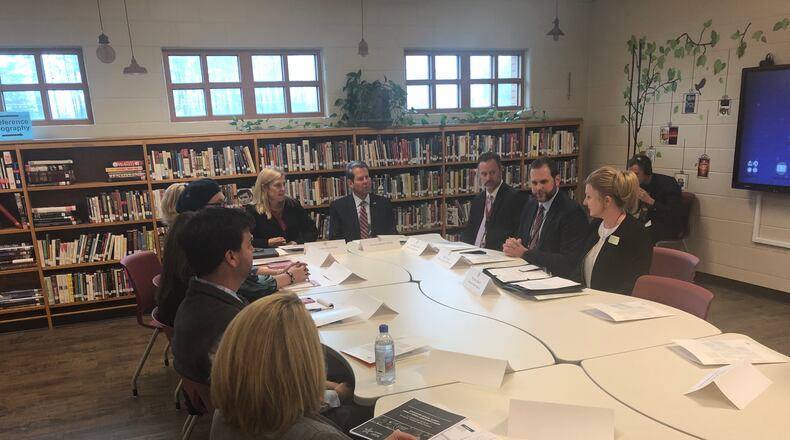Gov. Brian Kemp visited a pair of schools Monday to shine a spotlight on a new initiative tucked into his state budget proposal aimed at addressing mental health problems at Georgia schools.
The spending plan steers an extra $8.4 million to the Apex program, an organization that the Kemp administration views as crucial to identifying and counseling troubled students while also targeting issues that health experts say could threaten school safety.
Apex has been paying community-based mental health providers since 2015 to work in schools, where they help teachers spot signs of depression and anxiety, and provide counseling and other help to students who are at risk.
The program's budget has ballooned under Kemp and his predecessor, Gov. Nathan Deal, and Apex is set to use the new money included in this year's proposal solely to ramp up its work in high schools.
Kemp emphasized that mission in visits to two vastly different high schools: The first was Meadowcreek, the sprawling Gwinnett County school that’s one of the more diverse in the state. The second was Dawson County High School, a smaller school in a more rural setting.
Administrators at both describe mental health issues as a growing challenge for their teachers and students. At Dawson County, Kemp peppered health officials and teachers with questions about warning signs, the availability of counselors and the scope of the program.
Janice Darnell, a Dawson County administrator, said she hopes to leverage the program to expand training for teachers to spot warning signs of trauma from students who are more likely to hide any signs of distress.
“They want very much to show that they are good students, and they may push down what they’re really feeling,” Darnell said. “We want our teachers to look at behaviors and warning signs to get to the next level of help.”
Dawson County Schools Superintendent Damon Gibbs said the new funding will provide much-needed reinforcements to a region that’s suffered 10 student suicides over the past five years.
“Grant funding will do nothing but help us,” he said. “The work we’ve done is helping, but additional funding will let those services be expanded.”
Kemp’s focus on Apex largely emerged after his election.
In September, he outlined a $22.9 million proposal to put a counselor in every school tasked with guiding students battling mental-health issues, opioid abuse, bullying and other problems. He said Monday that as he learned more about Apex, however, he decided to shift funds toward the program.
“Why do we need to reinvent the wheel?” he said. “Sometimes, we have big ideas but we don’t ask the people implementing them. That’s why we are here today.”
At his visits, administrators encouraged him to pour more resources into the program next year — and gear state dollars to preventive care, such as providing more help to elementary school students. Kemp said he’s open to the idea.
“This is a start. We are going to have to work on it for a long time to get to where we need to be,” he said. “But it’s a start.”
Stay on top of what’s happening in Georgia government and politics at ajc.com/news/georgia-government/.
About the Author
Keep Reading
The Latest
Featured




